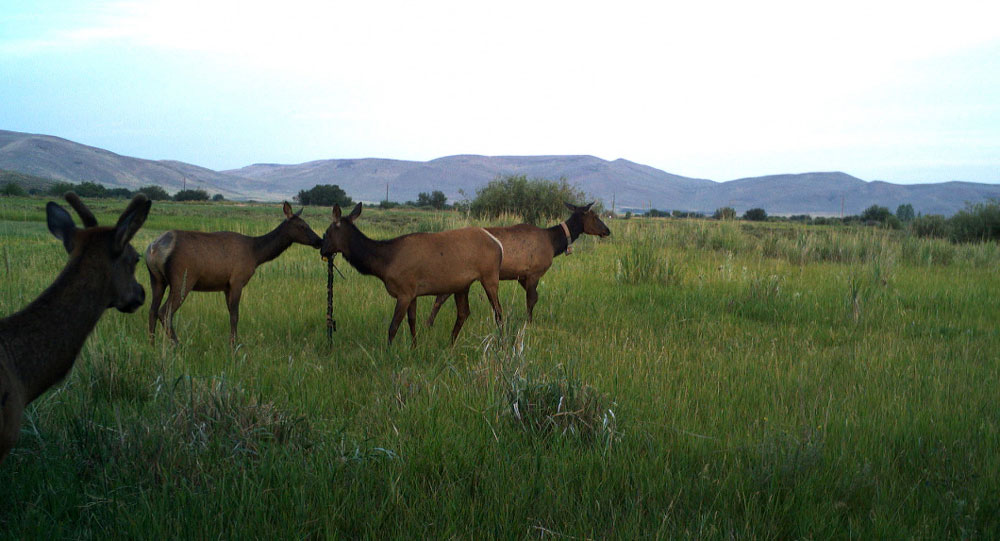Below is a news release from the Idaho Department of Fish and Game.
Over the last five or more years, farms throughout the Magic Valley Region have seen an increase in crop damages caused by ever-increasing elk populations that sometimes reside almost exclusively on private land. Fish and Game has worked cooperatively with landowners to find ways to prevent or reduce the damage to their crops, thereby reducing depredation claims for compensation. As required by Idaho law Fish and Game uses license funds to pay damage claims.
Fish and Game has worked since 2017 with a producer in the Little Camas area to prevent and reduce crop damage by elk. At times, this elk herd has exceeded 450 animals. These efforts are showing positive results for the landowner and the department. In 2018, in excess of $1 million was paid for damages caused by elk. In 2019, because of intensive prevention efforts, including hazing, hunting, and sharpshooting to mitigate elk damage, crop damages were down nearly 75% from the previous year. That’s a reduction of over $750,000 worth of damage.
Insert potato damage photo here
Efforts in 2018 and 2019 have had a measurable effect on elk behavior and reduced the number of depredating elk. Continuing such efforts should increasingly reduce the amount of agricultural damages, while simultaneously reducing the size of this elk herd that resides primarily on private land.
Fish and Game intends to continue to work aggressively in 2020 to keep elk out of the producer’s crops and to continue to reduce the herd size, using a variety of tools, including hunters.
Depredation management tools
Big game managers use a variety of tools to prevent or reduce the impacts of big game on crops. When reports come in about big game-caused damages, many factors are considered when determining the level of response necessary to change the behavior of depredating animals. Non-lethal actions, such as hazing or wildlife-proof fencing, are commonly used to prevent animals from causing agriculture damage. However, when non-lethal actions are ineffective or impractical, Fish and Game staff, landowners, and when appropriate, hunters, can use lethal actions to prevent agriculture damage. Hunters are the preferred method to reduce elk numbers because their harvest helps to reduce the size of the herd, saves funds, and puts food on Idahoans tables. However, the use of hunters is not always possible if public access to the area where damage is occurring is not feasible, or if animals are only causing damages at night.
Depredation management efforts in 2020 – 2021
Fish and Game has identified four management tools for use this summer and fall to continue reducing crop damage and depredation claims at the farm in the Little Camas area. Elk will be radio collared to allow Fish and Game to monitor elk behavior in response to these management actions.
The four management tools include:
- Initially, Fish and Game staff will aggressively use non-lethal hazing to deter elk from using the organic farm and depredating on their crops. Hazing techniques include noise and non-lethal rubber slugs and rubber buckshot.
- In the event nonlethal hazing becomes ineffective, Fish and Game staff will harvest elk at night on the farm. Nighttime shooting has become necessary due to elk feeding exclusively during the night, which limits the opportunity to use hunters to pursue elk. Over the last few years, elk were largely inaccessible during the day.
- In the event elk become accessible during daytime, Fish and Game will work with neighboring landowners to secure access for hunting. Hunters who possess Game Management Unit 44 antlerless tags and depredation tags would be eligible through a random drawing. Fish and Game staff will be onsite to manage all hunting activity.
- In mid-fall of 2020 and early spring 2021, Fish and Game will begin a trapping and translocation effort to continue reducing the size of the depredating elk herd. All elk will be tested for disease following state and federal protocols prior to release in other areas of the state.
Over the coming months Fish and Game will continue to monitor and communicate to Idahoans about the depredation actions occurring across the Magic Valley Region.
(Photo source: Idaho Department of Fish and Game)
NOTE: please include the potato damage photo within the post with this caption immediately beneath it: Elk-caused damage to potato crops
